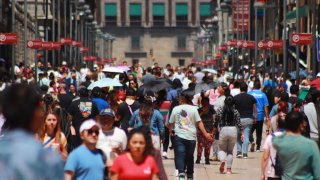
Mexican health authorities say there have been at least 112 heat-related deaths so far this year, acknowledging the deadliness of a recent heatwave that the president previously said was being overblown by alarmist journalists.
The report, released late Wednesday, also shows a significant spike in heat-related fatalities in the last two weeks. So far this year, the overall heat-related deaths are almost triple the figures in 2022.
The Health Department normally issues a report on heat-related fatalities each week, but in June — at the height of the heat wave — it skipped a week, for reasons that remain unclear.
The deaths reached a peak in the week of June 18-24, with 69 deaths in one week nationwide, an unprecedented number. Temperatures in some parts of Mexico have risen to over 105 degrees Fahrenheit (40 degrees Celsius) in recent weeks.
Get Boston local news, weather forecasts, lifestyle and entertainment stories to your inbox. Sign up for NBC Boston’s newsletters.
The week of June 11-17 was also unusually bad, with 31 deaths across the country.
So far this year, the largest number of deaths from heatstroke and dehydration have occurred in the northern border state of Nuevo Leon, home to the industrial hub of Monterrey.
President Andrés Manuel López Obrador claimed last week that mounting reports of heat deaths were untrue, and were part of a media campaign against his administration.
U.S. & World
“There is an alarmist, yellow-journalism trend,” López Obrador said, citing lower death figures that were already outdated at that time.
The high number of heat-related deaths appeared to be due in part not only to high temperatures, but to a delay in the onset of seasonal rains that normally come to Mexico in mid-June and tend to cool things off a bit.
The Health Department did not immediately respond to a request for comment on the delay in its delay in reporting the fatalities.
Nor was it clear why the president thought the deaths were a political issue, possibly because several media outlets reported claims that some of the deaths were caused by electricity shutoffs at some of the victims' homes.
López Obrador is a staunch defender of the state-owned power utility.



